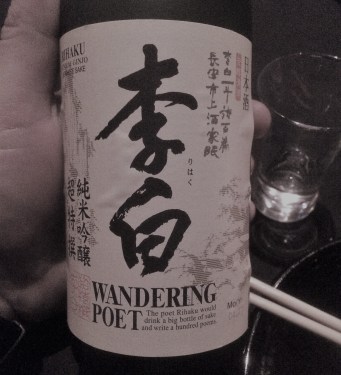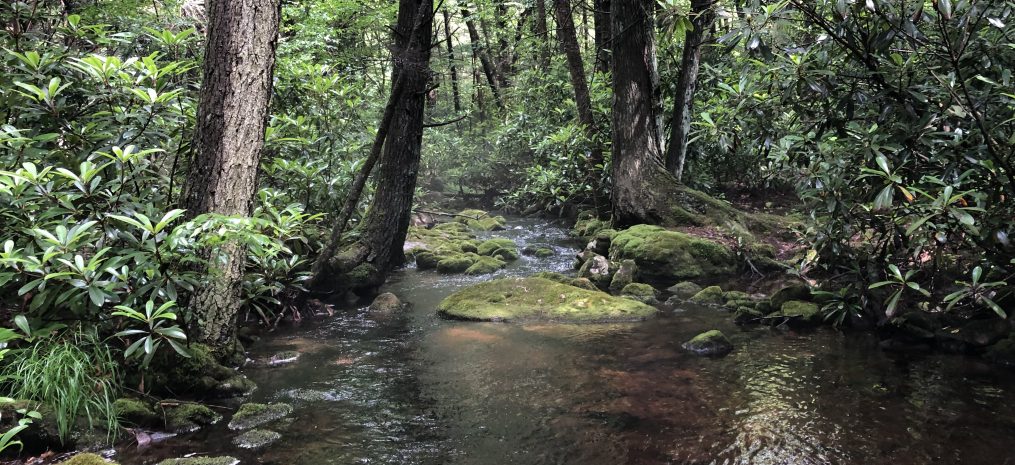
A very good bottle of sake I recently enjoyed with some friends. It has nothing to do with this post.
About a week ago the website Change Seven published an interview with me, conducted by writer Curtis Smith. The interview mostly focused on my book of poems, The Magician’s Handbook, that was released by PS Book in October. One question, however, asked about my writing process, and one part of my answer concerns a topic that’s important to me, so I’m going to elaborate here.
I stated in the interview that I often make up or exaggerate situations or events in my poems. I don’t think that’s a revolutionary concept, but sometimes it still leads to raised questions and sometimes raised eyebrows.
Truth, in poetry, is a complicated issue. I cringe when I hear poets talk about how they’re writing the truth or getting at the truth or whatever truthiness idea they go on about. Maybe that’s because I equate truth with facts, and in world where anything a person doesn’t agree with is branded as fake news, truth can be difficult.
Rather than aiming for truth in my poems, I aim for real or authentic (again, a vague and unhelpful word, sorry). Do the situations in the poem feel real, does it move or affect the way real feels move or affect. There’s a sort of truth, I suppose, in all my poems, and many of them do include autobiographical references, but rarely are they completely loyal to the events or people referenced. Because a poem is written in the first person doesn’t mean that it’s naturally about my experience or that the experience happened the way it’s depicted in the poem. It’s always bothered me that a short story is assumed to be fiction (in part because that’s how we’ve come to compartmentalize the genres) while poems are not. The fact that “creative non-fiction” is its own genre kind of baffles me.
Rather than sticking to the facts, my loyalty in writing is to the language—the way it sounds, the response it makes in my gut, the pictures it draws in the head and the places it steers me.
I raise this point because I think it’s important that poets feel free to create, not report. I’ve had students resist following the language out of fear of not properly reporting the facts.
I’ve had people ask me, usually after readings, about specific things in poems, and sometimes they’re disappointed if I tell them part of it was made up. I’ve burned down buildings, broken up with girlfriends, lived in towns, and killed off family members, all that didn’t exist. Every time I publish a book I’ve had to explain to my parents (who are still alive, despite what one of my poems says) not to take it too seriously.
Of course I’m guilty of the fallacy of autobiography too. In being moved by every Philip Levine poem about a factory, I have to remind myself that he didn’t, in fact, work for 40 years in every auto plant in Detroit, however it might seem that way.
Anyway, this is at the top of my mind now because my next book (which is due out this month) includes a section drawn on a group of people who are incredibly close to my heart, yet, out of necessity, are semi-fictional. It’s a series of poems set in the 1980s and describes my sort-of reckless teenage years. Names are changed, events are changed, though there’s a realness to it all that’s important. The three or four recurring characters in those poems are mash ups of about ten different people, as are the stories they act in. It’s easier for me to write that way, and allows me to be loyal to the language, which is what’s really more important for the poetry.

Aiming for real–isn’t that what critics like to call “authenticity”? Not that I have a problem with authenticity, which overlaps “voice.”
Anyway, I like what you say here: “Rather than sticking to the facts, my loyalty in writing is to the language—the way it sounds, the response it makes in my gut, the pictures it draws in the head and the places it steers me.”
Yeah, I have had the experience of a family member telling me, “But that’s not how it was!” –and I’m saying, look I know that, but the poem works better this way.
Congrats on the upcoming book! You’ve had some publication coups lately–good for you!
I agree, and I think authenticity is a better word for it. “Real” is close enough to “true” to be equally problematic. I guess I mean real as in, it’s a real poem, in the same way that a painting of a tree is real, even if the tree itself is imaginary.
I am reading the Magician’s Handbook and get the feeling that you are the MAGICIAN. I feel these poems can be read as some sort of autobiography. Any truth?